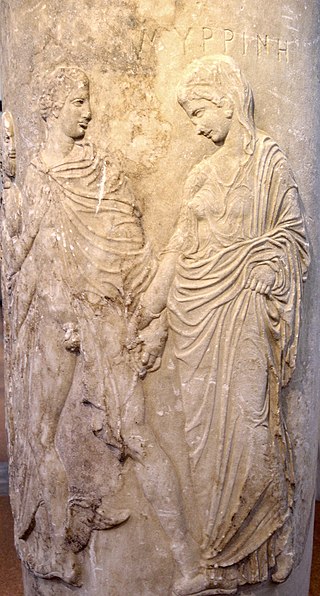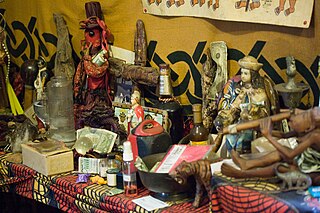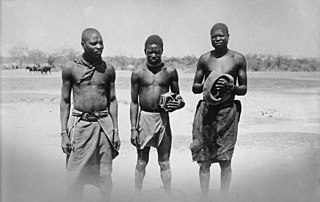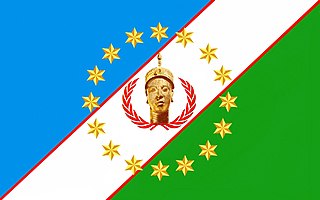Related Research Articles

Psychopomps are creatures, spirits, angels, demons, or deities in many religions whose responsibility is to escort newly deceased souls from Earth to the afterlife.
The Tumbuka are an ethnic group living in Malawi, Zambia, and Tanzania. In Tumbuka mythology, Chiuta is the Supreme Creator and is symbolised in the sky by the rainbow.
Yaa Asantewaa I was the Queen Mother of Ejisu in the Ashanti Empire, now part of modern-day Ghana. She was appointed by her brother Nana Akwasi Afrane Okese, the Edwesuhene, or ruler, of Edwesu. In 1900, she led the Ashanti war also known as the War of the Golden Stool, or the Yaa Asantewaa War of Independence, against the British Empire.
The Bobo Ashanti, also known as the Ethiopian African Black International Congress (E.A.B.I.C.), is a religious group originating in Bull Bay near Kingston, Jamaica.

Kumasi is a city and the capital of the Kumasi Metropolitan Assembly and the Ashanti Region of Ghana. It is the second largest city in the country, with a population of 443,981 as of the 2021 census. Kumasi is located in a rain forest region near Lake Bosomtwe and is located about 200 kilometres (120 mi) from Accra. The city experiences a tropical savanna climate, with two rainy reasons which range from minor to major. Major ethnic groups who lived in Kumasi are the Asante, Mole-Dagbon and Ewe. The current mayor of the metropolitan is Samuel Pyne.

African diaspora religions, also described as Afro-American religions, are a number of related beliefs that developed in the Americas in various nations of the Caribbean, Latin America and the Southern United States. They derive from traditional African religions with some influence from other religious traditions, notably Christianity and Islam.

Ghana is a country of 33.48 million people and many native groups, such as:

The Ovambo people, also called Aawambo, Ambo, Aawambo, or Ovawambo (Kwanyama), are a Bantu ethnic group native to Southern Africa, primarily modern Namibia. They are the single largest ethnic group in Namibia, accounting for about half of the population. Despite concerted efforts from Christian missionaries to wipe out what were believed to be 'pagan practices', they have retained many aspects of their cultural practices. They are also found in the southern Angolan province of Cunene, where they are more commonly referred to as "Ambo". The Ovambo consist of a number of kindred Bantu ethnic tribes who inhabit what was formerly called Ovamboland. In Angola, they are a minority, accounting for about two percent of the total Angolan population.
Womanist theology is a methodological approach to theology which centers the experience and perspectives of Black women, particularly African-American women. The first generation of womanist theologians and ethicists began writing in the mid to late 1980s, and the field has since expanded significantly. The term has its roots in Alice Walker's writings on womanism. "Womanist theology" was first used in an article in 1987 by Delores S. Williams. Within Christian theological discourse, Womanist theology emerged as a corrective to early feminist theology written by white feminists that did not address the impact of race on women's lives, or take into account the realities faced by Black women within the United States. Similarly, womanist theologians highlighted the ways in which Black theology, written predominantly by male theologians, failed to consider the perspectives and insights of Black women. Scholars who espouse womanist theology are not monolithic nor do they adopt each aspect of Walker's definition. Rather, these scholars often find kinship in their anti-sexist, antiracist and anti-classist commitments to feminist and liberation theologies.

The Asante Empire, also known as the Ashanti Empire, was an Akan state that lasted from 1701 to 1901, in what is now modern-day Ghana. It expanded from the Ashanti Region to include most of Ghana and also parts of Ivory Coast and Togo. Due to the empire's military prowess, wealth, architecture, sophisticated hierarchy and culture, the Asante Empire has been extensively studied and has more historic records written by European, primarily British, authors than any other indigenous culture of sub-Saharan Africa.

Asase Ya/Afua is the Akan goddess of fertility, love, procreation, peace, truth and the dry and lush earth in Ghana and Ivory Coast. She is also Mother of the Dead known as Mother Earth or Aberewaa.

The Yoruba people are a West African ethnic group who mainly inhabit parts of Nigeria, Benin, and Togo. The areas of these countries primarily inhabited by the Yoruba are often collectively referred to as Yorubaland. The Yoruba constitute more than 50 million people in Africa, are over a million outside the continent, and bear further representation among members of the African diaspora. The vast majority of the Yoruba population is today within the country of Nigeria, where they make up 20.7% of the country's population according to Ethnologue estimations, making them one of the largest ethnic groups in Africa. Most Yoruba people speak the Yoruba language, which is the Niger-Congo language with the largest number of native or L1 speakers.

The Asante, also known as Ashanti in English, are part of the Akan ethnic group and are native to the Ashanti Region of modern-day Ghana. Asantes are the last group to emerge out of the various Akan civilisations. Twi is spoken by over nine million Asante people as their native language.

Akan religion comprises the traditional beliefs and religious practices of the Akan people of Ghana and eastern Ivory Coast. Akan religion is referred to as Akom. Although most Akan people have identified as Christians since the early 20th century, Akan religion remains practiced by some and is often syncretized with Christianity. The Akan have many subgroups, so the religion varies greatly by region and subgroup. Similar to other traditional religions of West and Central Africa such as West African Vodun, Yoruba religion, or Odinani, Akan cosmology consists of a senior god who generally does not interact with humans and many gods who assist humans.

Bantu religion is the system of beliefs and legends of the Bantu people of Africa. Although Bantu peoples account for several hundred different ethnic groups, there is a high degree of homogeneity in Bantu cultures and customs, just as in Bantu languages. Many Bantu cultures traditionally believed in a supreme god whose name is a variation of Nyambe/Nzambe.

West African mythology is the body of myths of the people of West Africa. It consists of tales of various deities, beings, legendary creatures, heroes and folktales from various ethnic groups. Some of these myths traveled across the Atlantic during the period of the Trans-Atlantic slave trade to become part of Caribbean, African-American and Brazilian mythology.
Adae Kese Festival is an important albeit rare celebration among the Ashantis in Ghana. There are two main periods for this celebration: one is Awukudae, and the other is Akwasidae. It glorifies the achievements of the Asante kingdom. It was first celebrated to the achievement of statehood of the people, after the war that the Ashantis had their independence, in the Battle of Feyiase which they fought against the people of Denkyira. It is also the occasion when the purification ceremony of Odwira is performed at the burial shrines of ancestral spirits. Generally, this coincides with the harvest season of yam and hence the ritual was also called the "Yam custom" by Europeans. It is celebrated every two weeks by the people in accordance with the calendar of the Akans based on the cycle of forty-two days and nine months in their calendar. The festival is mostly held to climax celebrations of specific achievements and milestones of the people of the Ashanti kingdom. The festival is a day of rest so it is forbidden to work on that day.

Adae Festival is a celebration in Ashanti. Considered a day of rest, it is the most important ancestral custom of the Ashanti people.
Kwase Benefo, or Kwasi Benefo, is a mythic hero featured in the mythology of Ashanti people in Ghana. He is well known for his encounter with Amokye, the Ashanti psychopomp, during his journey to the underworld (asamando) to be reunited with his wives.
Asamando, roughly translated as "place of the dead", or "cemetery" is In the religious traditions of the Akan people of Ghana, is the name of the underworld in Akan mythology, ruled by the Anadwora. In some Akan folk traditions, the Milky Way is seen as the road to Asamando. In other folk traditions, Asamando is believed to be across from a raging lake, that has a current so strong that it cannot be crossed.
References
- ↑ PhD, Patricia Monaghan (2014-04-01). Encyclopedia of Goddesses and Heroines. New World Library. p. 4. ISBN 978-1-60868-218-8.
- 1 2 3 Asante, Molefi Kete; Mazama, Ama (2009). Encyclopedia of African Religion. SAGE. p. 41. ISBN 978-1-4129-3636-1.
- ↑ Lynch, Patricia Ann; Roberts, Jeremy (2010). African Mythology, A to Z. Infobase Publishing. p. 7. ISBN 978-1-4381-3133-7.